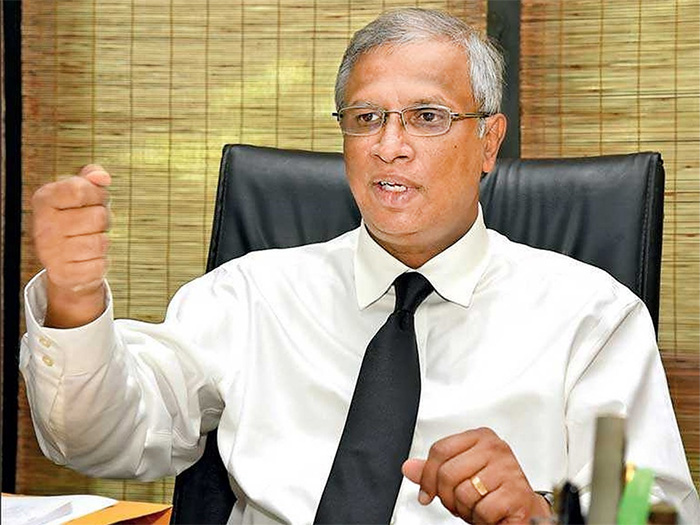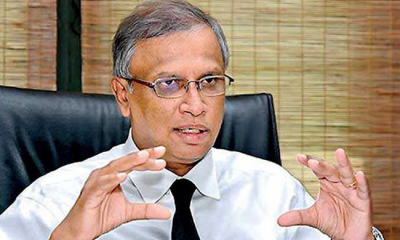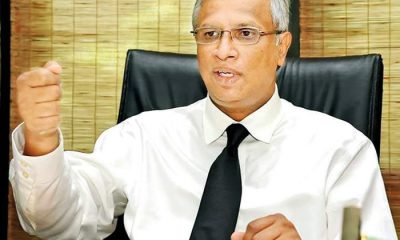News
Tamils’ struggle for political rights reasonable, says Sumanthiran

TNA MP M.A.Sumanthiran told Parliament yesterday that the Tamils’ struggle was a struggle for justice.
“It is a reasonable struggle for political rights. Our struggle may be too long and hazardous. But we will attain a just solution if we continue in the non-violent path without deviating from it,” he said, making a statement to the House.
Full text of Sumanthiran’s statement: “This week we commemorate the 15th anniversary of the Mullivaikkal killings and other atrocities. It was a time when our people were locked into a narrow strip of land with no avenue for escape and had to survive only on kanji, while losing many loved ones and seeing many others maimed due to heavy shelling and shootings.
When the sound of guns and bombs eventually ceased, many were shot dead by the Army as they emerged from the war zone. Men and women of a certain age were forced to surrender to the security forces, never to be seen again. The others were forcibly herded into camps, surrounded by barbed wires, and kept as prisoners for over one and a half years, unlawfully. No one has been prosecuted or found guilty for any of these serious international crimes to date.
In the reports of the Panel Of Experts, dated 31st March 2012, handed over to UN Secretary General and the OISL international inquiry released in September 2015, the fact that several internal crimes were committed during the last stages of the war and that persons responsible should be prosecuted and punished have been strongly recommended.
The Sri Lankan government co-sponsored Resolution HRC/30/1 on the 1st of October 2015, at the UNHRC which underline the importance of the participation of investigators, prosecutors, defence attorneys and judges in a judicial mechanism. However, the Sri Lankan government later resiled from that commitment.
I consider this moment, 15 years after the end of the armed struggle, as the opportune time to reflect and act on the changes that had happened in the political, social and economic positions of the Tamils.
An armed struggle was waged for our political liberation. Although it is my personal belief that a just political liberation cannot be achieved at the point of a gun, I have repeatedly stated that we cannot today decry or judge the decision taken by the Tamil youth who saw no other option at a time when oppression and military suppression was enforced on our people. I have also consistently emphasised that the commitment and sacrifices unselfishly made by those who took up arms on our behalf should be regarded very highly. However, there is not one Tamil who would even dream of another armed struggle as an option after this sacrificial struggle was silenced 15 years ago.
It is in this background that I suggest, as an important step, an introspection as to whether the strategies we have adopted in the last 15 years have been successful or not.
If we keep aside the struggle for political liberation for a moment, and look at our social and economic life, it’ll be apparent that we have continuously regressed. The evidence of this is found in the increase in drug abuse and violent gang warfare among our youth. These are efforts to weaken our youth and although it may be true that the rulers are encouraging this, still the primary responsibility to contain these trends rests with our political and community leaders.
Although extraneous factors such as cinema contribute towards violence and drug abuse, we have failed to take effective action to counter such forces. If this regression continues our youth will be rendered as persons who are ill-equipped to handle responsibilities even if we attain political freedom. It is a matter of pride that our youths have excelled at National, Regional and International levels in the fields of arts, culture and sports. This underscores the importance of investing effectively in developing the abilities and talents of our youth.
Similarly, although several projects have been undertaken with the help of our diaspora in order to uplift the lives of our people whose economic status has been severely weakened, we have not done anything to create job opportunities in a big way in order that our youth may continue to live here with dignity and self-respect and dissuade them from leaving the country. This fact was exposed by the way the youth voted in the Jaffna district in the last general elections.
The two factors referred to above are not unconnected to our political rights. On the contrary they are intrinsically interwoven. Our path to political freedom must have a holistic approach. The bitter truth is that we have failed in the last 15 years to follow such a path.
One slight exception is the period of the last Parliament, 2015 – 2019. During that time large areas of land under military control were released and significant sums of money were allocated for the development of our areas which were neglected for several decades. But subsequently we are aware that land grab efforts have been accelerated and several acts of oppression are imposed on our people. These trends must be arrested and reversed if we are to protect “Tamil Nationalism” and continue to live on this Island as a Nation. We cannot move our freedom struggle even an inch by mere rhetoric or speeches that ignite feelings of a war mentality or by passing resolutions that have no practical value. While we loudly proclaim our status as a nation, we must also engage in strategies that would enable us to continue to live as a nation.
We who are committed to follow the path set by our founder Chelvanayakam, must eschew violence and all different manifestations of the same. If the life sacrifices made by our youth are not to be in vain, there must be clarity in our thinking and speech with regard to our approaches that do not instigate violence. The warning given by Mr. Chenlanayakam: “We who set out to do good for our people, ourselves would have brought about their annihilation” to the youth who started acts of violence in 1957 is relevant to today’s context too.
While we remain steadfast in our policy and fight for a change in the governance systems that would enable us to live with dignity and self-respect, we must handle the opportunities that arise at elections and other times with sharp diplomatic acumen.
This is the approach that must necessarily be adopted by those numerically in the minority in any democratic set up. We must explain in appropriate ways to the other communities also that the Tamil National Question is the most important national question in the country. We must make them realise that acknowledging us as a nation will do no harm to their own status in the country.
Our struggle is a struggle for Justice; it is a reasonable struggle for political rights. Our struggle may be too long and hazardous. But we will attain a just solution if we continue in the non-violent path without deviating from it. I call on everyone to join us in such a pure and just struggle. Let us march towards a future with hope and confidence.”
News
US sports envoys to Lanka to champion youth development

The U.S. Embassy in Colombo welcomed the U.S. Sports Envoys to Sri Lanka, former National Basketball Association (NBA) and Women’s National Basketball Association (WNBA) players Stephen Howard and Astou Ndiaye, from June 8 through 14.
The Public Diplomacy section of the U.S. Embassy said that it would launch a weeklong basketball program intended to harness the unifying power of sports, made possible through collaboration with Foundation of Goodness and IImpact Hoop Lab.
While in Sri Lanka, Howard and Ndiaye, both retired professional basketball players, will conduct a weeklong program, Hoops for Hope: Bridging Borders through Basketball. The Sports Envoys will lead basketball clinics and exhibition matches and engage in leadership sessions in Colombo and Southern Province for youth aged 14-18 from Northern, Uva, Eastern and Western Provinces, offering skills and leadership training both on and off the court. The U.S. Envoys will also share their expertise with the Sri Lanka Basketball Federation, national coaches, and players, furthering the development of basketball in the country. Beyond the clinics, they will collaborate with Sri Lankan schoolchildren to take part in a community service project in the Colombo area.
“We are so proud to welcome Stephen and Astou as our Sports Envoys to Sri Lanka, to build on the strong people-to-people connections between the United States and Sri Lanka,” said U.S. Ambassador Julie Chung. “The lessons that will be shared by our Sports Envoys – communication, teamwork, resilience, inclusion, and conflict resolution – are essential for leadership development, community building, equality, and peace. The U.S. Sports Envoy program is a testament to our belief that sports can be a powerful tool in promoting peace and unity.”
News
Rahuman questions sudden cancellation of leave of CEB employees

SJB Colombo District MP Mujibur Rahuman in parliament demanded to know from the government the reasons for CEB suspending the leave of all its employees until further notice from Thursday.
MP Rahuman said that the CEB has got an acting General Manager anew and the latter yesterday morning issued a circular suspending leave of all CEB employees with immediate effect until further notice.
“We demand that Minister Kanchana Wijesekera should explain this to the House. This circular was issued while this debate on the new Electricity Amendment Bill was pending. There are many who oppose this Bill. The Minister must tell parliament the reason for the urge to cancel the leave of CEB employees,” the MP said.However, Speaker Mahinda Yapa Abeywardena prevented Minister Wijesekera responding to the query and said that the matter raised by MP Rahuman was not relevant.
News
CIPM successfully concludes 8th Annual Symposium

The Chartered Institute of Personnel Management (CIPM) successfully concluded the 8th Annual CIPM Symposium, which took place on 31st May 2024. Themed “Nurturing the Human Element—Redefining HRM in a Rapidly Changing World,” the symposium underscored the pivotal role of human resource management (HRM) in today’s dynamic global landscape. Since its inception in 1959, CIPM has been dedicated to advancing the HR profession through education, professional development, and advocacy, solidifying its position as Sri Lanka’s leading professional body for HRM.
Ken Vijayakumar, the President of the CIPM, graced the occasion as the chief guest. The symposium commenced with the welcome address by the Chairperson, Prof. Arosha Adikaram, followed by the Web Launch of the Symposium Proceedings and Abstract Book by the CIPM President. The event featured distinguished addresses, including a speech by Chief Guest Ken Vijayakumar, President of CIPM, and an address by Guest of Honor Shakthi Ranatunga, Chief Operating Officer of MAS Holdings Pvt. Ltd., Sri Lanka.
The symposium also featured an inspiring keynote address by Prof. Mario Fernando, Professor of Management and Director of the Centre for Cross Cultural Management (CCCM) at the University of Wollongong, Australia.
Vote of Thanks of the inauguration session was delivered by Dr. Dillanjani Weeratunga, Symposium Co-chair.
The symposium served as a comprehensive platform for researchers to present their findings across a wide range of critical topics in HRM. These included Cultural Diversity and Inclusion, Talent Development and Retention, Ethical Leadership and Corporate Social Responsibility, Adapting to Technological Advancements, Mental Health and Well-being at Work, Global Workforce Challenges, Employee Empowerment, and Reskilling and Upskilling.
The plenary session was led by Prof. Wasantha Rajapakse. Certificates were awarded to the best paper presenters during the valedictory session, followed by a vote of thanks delivered by Kamani Perera, Manager of Research and Development.
The annual symposium of CIPM was a truly inclusive event, attracting a diverse audience that spanned undergraduates, graduates, working professionals, research scholars and lecturers. This widespread interest highlights the symposium’s significance in the field of HRM, offering a unique opportunity for everyone to network and learn from scholarly brains.The CIPM International Research Symposium was sponsored by Hambantota International Port, Sri Lanka Institute of Information Technology (SLIIT), E B Creasy & Co. PLC, and Print Xcel Company.
















